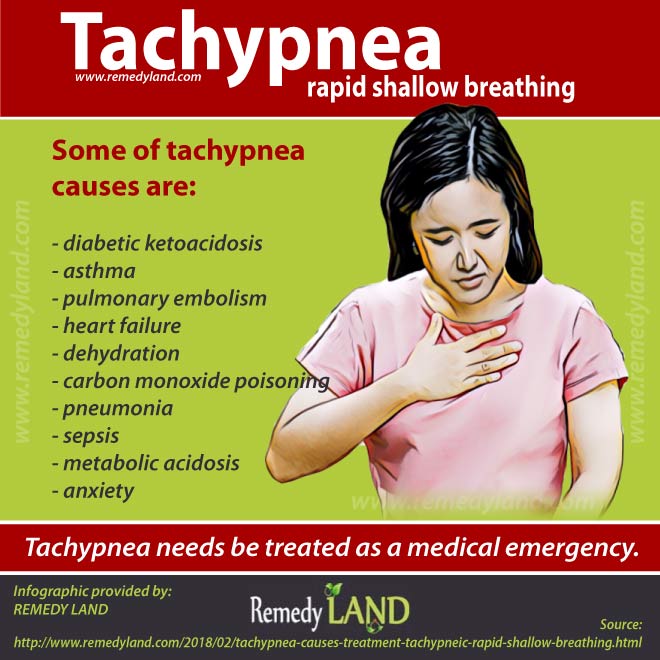What is tachypnea? (definition)
Tachypnea (tachypneic) is a medical term for a rapid shallow breathing or an abnormally rapid respiration. Breathing problems in adults and newborns are caused by a buildup of carbon dioxide in the lungs. Due to acidity of blood, brain sends signals to the respiratory system to pick up its pace and stabilize the blood’s pH. This buildup can be result of anything from a respiratory infection to a heart failure.
Page Contents
- What is tachypnea? (definition)
- What is fast respiratory rate?
- Tachypnea: causes of rapid breathing
- Diabetic ketoacidosis can cause rapid and smelly breathing
- Asthma related tachypnea
- Tachypneic induced by pulmonary embolism
- Rapid shallow breathing caused by heart failure
- Tachypnea caused by dehydration
- Carbon monoxide poisoning can cause tachypneic
- Pneumonia and rapid shallow breathing
- Tachypnea induced by sepsis
- Metabolic acidosis can cause tachypneic
- Anxiety caused rapid shallow breathing
- Tachypnea treatment: How to stop rapid shallow breathing
What is fast respiratory rate?
The average adult human at rest have between 12 and 20 breaths per minute. Tachypnea in adults or rapid breathing rate is greater than 20 breaths per minute. Small children and infants have significantly higher respiratory rate, newborn up to 60, infants up to 50 breaths per minute, which will decline rapidly in first three years of life.
Tachypnea: causes of rapid breathing
Rapid, shallow breathing may have pathological and physiological causes. Tachypneic might be caused by acute conditions or carbon monoxide poisoning in case of pathological causes. On the other hand, can be caused by physical effort, labor during pregnancy or stress in case of physiological causes.
Some of tachypnea causes are:
- diabetic ketoacidosis
- asthma
- pulmonary embolism
- heart failure
- dehydration
- carbon monoxide poisoning
- pneumonia
- sepsis
- metabolic acidosis
- anxiety

Diabetic ketoacidosis can cause rapid and smelly breathing
This serious and life-threatening condition occurs in people with diabetes. When the body starts to run out of insulin and starts producing high levels of harmful substances called ketones in your blood, one of the major symptoms is tachypnea, a rapid breathing with a specific smell. The patient may also experience vomiting, frequent urination … fatigue and stomach pain.
Patients with asthma, a chronic inflammatory disease of the lungs that inflames and narrows the airways, frequently have a rapid shallow breathing with whistling or wheezy sounds. The coughing and chest tightness often occur at night, during sleep or early in the morning.
Tachypneic induced by pulmonary embolism
Tachypnea as a one of pulmonary embolism symptoms happens when artery in the lungs is blocked by a blood clot which commonly comes from the deep veins. These blood clots are usually small, but they can make a damage to the lung and be fatal. Besides rapid breathing rate, patient may experience chest pain, sweating, coughing up blood and irregular heartbeat.
Rapid shallow breathing caused by heart failure
Heart inability to properly pump blood around the body is called heart failure. When the heart is not able to pump enough blood and meet body’s needs for oxygen, patient starts to breath rapidly to compensate for the lack of oxygen. Other symptoms are excessive tiredness, edema, exercise intolerance and chronic cough.
Tachypnea caused by dehydration
When the body excretes too much water and doesn’t have as much water as it needs, short shallow breathing may occur. Causes of dehydration are broad, but symptoms are clear. Besides tachypnea patient is going to experience rapid heartbeat, lightheadedness, dry mouth, weakness, fainting and muscle cramps.
Carbon monoxide poisoning can cause tachypneic
Breathing in too much carbon monoxide can make you unwell. This is particularly dangerous because it has no smell or taste and can kill you. People with chronic heart disease are especially endangered. One of the first symptoms of carbon monoxide poisoning is tachypnea, followed by headache, chest pain, dizziness and nausea.
Pneumonia and rapid shallow breathing
Anyone can get an infection in one or both lungs. Therefore, tachypnea caused by pneumonia is very common. Pneumonia is usually caused by bacteria, viruses, or fungi and it is going to affect the small air sacs known as alveoli and cause problems with breathing. Other symptoms are dry cough, fever, coughing out yellow or bloody mucus, sweating and shaking chills.
Tachypnea induced by sepsis
The life-threatening condition known as sepsis occurs when body responses to an infection and releases chemicals into the bloodstream. The rapid shallow breathing is one of the major symptoms caused by sepsis, followed by abnormal heart functions, changes in mental ability, chills and shivering, low or high body temperature, decreased urination and septic shock.
Metabolic acidosis can cause tachypneic
The buildup of acid in the body is common condition in patients with kidney disease or kidney failure. When the kidneys cannot remove enough acid from the body, breathing problems may occur along with jaundice, headache, big drops in blood pressure, altered appetite, muscle weakness and increased heart rate.
Anxiety caused rapid shallow breathing
Anxiety is term for mental disorders characterized by extreme fear or worry. All those mental disorders have tachypnea in common among other symptoms like fast heart rate, sleep problems, heart palpitations, numb or tingling hands or feet, dry mouth and shakiness.
Tachypnea treatment: How to stop rapid shallow breathing
Treatment options depend on the cause of a breathing problems. Tachypnea needs be treated as a medical emergency. The underlying condition must be identified quickly and effectively. Consultation with a doctor is very important, especially if you are experiencing rapid shallow breathing for the first time.

